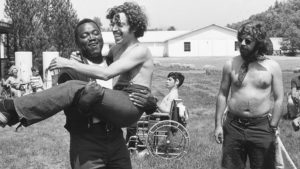Sundance 2020: “Crip Camp”
I don’t really like to wax personal in my reviews, but due to the fact that my wife and I have a happy and tenacious 21 year old with cerebral palsy at home, I was predisposed to be moved by the 2020 Sundance Film Festival opening-night documentary “Crip Camp” on some kind of level. While I do often tend to fawn over our little princess (what can I say? She’s a daddy’s girl) and give in to her colorful demands, it should be noted that the Mrs. and I don’t really like to use the word “disability” around the house. For us, it’s all about ability, and for the most part, the new Netflix documentary “Crip Camp” from directors James Lebrecht and Nicole Newnham and producers Barack and Michelle Obama backs up that particular thought process.
Back in the early 70’s, just down the road from Woodstock, Camp Jened would become all the rage. But this was no ordinary summer camp. No, Jened — the brainchild of Larry Allison — would become a utopia for teenagers with disabilities, a place where these individuals could be free to be themselves without any judgment from the outside world. Through intimate conversations captured by film students nearly 50 years ago, eye-opening archival footage, and a collection of then-and-now interviews, “Crip Camp” weaves an epic tapestry about discrimination, institutionalization, love, friendship, family, and disability rights as it follows a handful of these wonderful people from their glorious teenage days during the hippie era through a profound disability rights advocacy movement that would shape who many of them would ultimately become today.
 “Crip Camp” doesn’t shy away from showing the hardships that come with those who have disabilities. From physical issues to psychological issues, everything is on full display here. The film is even frank and honest when delving into terrain we’re not used to hearing about when it comes to the handicapped: marriage, sex, depression, anxiety, embarrassment, etc. No stone is left unturned. That said, this documentary really puts more of an emphasis on the “I can” as opposed to the “I can’t,” and that’s one of the primary reasons why it’s so worth watching.
“Crip Camp” doesn’t shy away from showing the hardships that come with those who have disabilities. From physical issues to psychological issues, everything is on full display here. The film is even frank and honest when delving into terrain we’re not used to hearing about when it comes to the handicapped: marriage, sex, depression, anxiety, embarrassment, etc. No stone is left unturned. That said, this documentary really puts more of an emphasis on the “I can” as opposed to the “I can’t,” and that’s one of the primary reasons why it’s so worth watching.
Since a great deal of this documentary has been culled together from hours upon hours of footage taken at Camp Jened back in the early ’70s, we get to hear about the life experiences of those with disabilities from the subjects themselves, making for a great deal of first-hand insight. While the film offers up that insight from multiple subjects, the majority of “Crip Camp” is told through the eyes of Lebrecht, the affable co-director of the film, and Judith Heumann, a prominent figure among the disabled and one who would go on to advocate for the rights of the disabled for the majority of her life.
From a technical level, it should be noted that the quality of the footage in “Crip Camp” is impressive, both in terms of image and sound. Again, a great deal of the intimate Camp Jened footage was captured nearly 50 years ago, so the fact that it’s all been preserved to this degree is a bit of a mini-miracle.
From an editing standpoint, “Crip Camp” sometimes lacks cohesion, and it could have used a little tightening. It should also be noted that for me, “Crip Camp” works best when it simply allows its very colorful and very human subjects to share their experiences and thoughts with such openness and honesty. The second half of the picture delves almost exclusively into the disability rights movement, and while there’s quite clearly a large degree of importance to the subject, the intimate and unfiltered first half of the picture moved me more than the more politically charged second half.
All of that said, when it comes to the topic of representation, especially in a current anger-filled and social-media-dominated culture, “Crip Camp” is refreshing in that it explores a group that truly does lack representation in the grand scheme of things. And even though I preferred the more intimate nature of the first half of “Crip Camp,” the entire movie is well worth watching, particularly if your life has personally been touched by someone with a disability. And no matter who you are, after experiencing this film, you’re very likely to look at folks with handicaps in an entirely new light.
Articles related to “Sundance 2020: ‘Crip Camp’ is an honest and eye opening look at individuals with disabilities”
Movie Review: “Jumanji: The Next Level” creatively allows leads to stretch their comical chops
Movie Review: “Star Wars: The Rise of Skywalker” is disappointing and fun in equal measure




